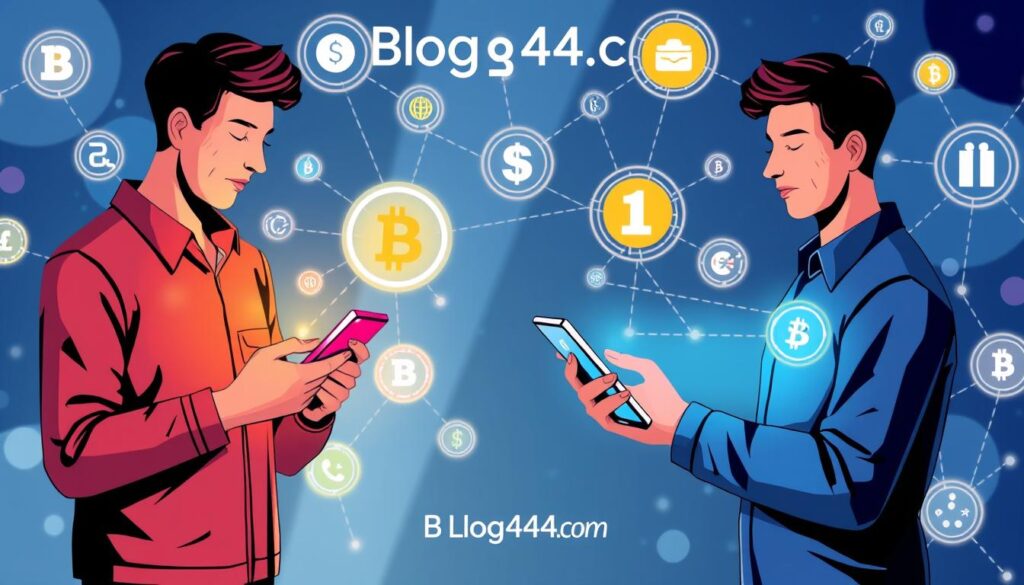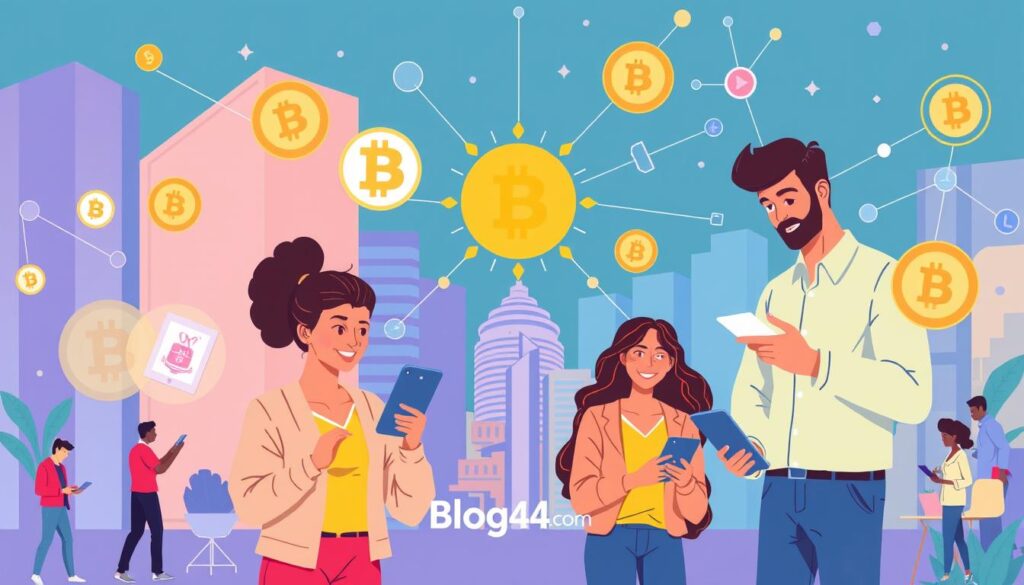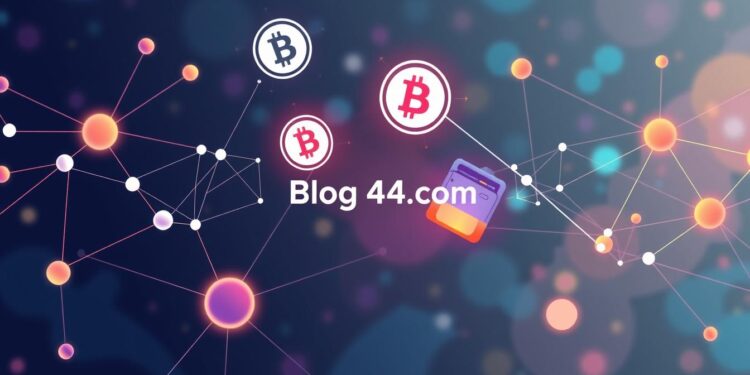Did you know that in India, peer-to-peer (P2P) money transfers are becoming more popular? This is thanks to more people using smartphones and digital payments like Unified Payments Interface (UPI)1. Paytm is a favorite for many looking for the best P2P app in India1. This trend is changing how we handle money, making it easier, faster, and cheaper1.
Peer-to-peer transactions let you send money directly to others without middlemen. Mobile apps and digital wallets make these transactions smooth and quick. They’re great for splitting bills, paying rent, and sending money to loved ones2. This technology helps more people manage their money easily and securely, giving you more control over your finances.
Key Takeaways
- Peer-to-peer transactions offer a convenient and cost-effective way to manage your finances.
- These transactions are facilitated by mobile apps and digital wallets, providing instant and 24/7 accessibility.
- Peer-to-peer platforms utilize robust security measures, including encryption and two-factor authentication, to protect your sensitive transaction details.
- The decentralized nature of peer-to-peer transactions promotes financial inclusion and empowers users with greater control over their money.
- Peer-to-peer solutions are gaining popularity for a wide range of use cases, from personal payments to small business transactions and charitable donations.
What Are Peer-to-Peer Transactions?
Peer-to-peer (P2P) transactions are when people send money directly to each other using digital platforms. This way, you don’t need banks to transfer money. It’s fast, easy, and often cheaper3. You can use mobile apps to make these transfers, making it simple and quick3.
Definition and Overview
P2P transactions are like giving cash to a friend, but online. They let people send and get money without banks4. Even cryptocurrencies like Bitcoin use P2P networks for secure transactions without a central authority4.
How They Differ from Traditional Transactions
P2P transactions don’t need banks, which makes them different from traditional banking5. They can save you money and time5. Plus, they usually have lower or no fees, which is a big plus for users3.
| Feature | Peer-to-Peer Transactions | Traditional Transactions |
|---|---|---|
| Intermediaries | Eliminated | Involved (e.g., banks) |
| Transaction Speed | Instant | May be delayed |
| Fees | Low or no fees | Higher fees |
| Accessibility | Widely available through digital platforms | May be limited by geographical location and banking access |
“Peer-to-peer transactions are revolutionizing the way we think about money transfers, making them more direct, convenient, and cost-effective.”
How Peer-to-Peer Transactions Work
Peer-to-peer (P2P) transactions use blockchain technology and digital platforms. They allow direct transfers between people or small businesses, skipping traditional banks6. This method is fast, secure, and cheaper than old banking ways, great for sending money across borders and for mobile payments6.
The Role of Technology
Mobile apps and online platforms are key in P2P transactions. Users download the app, set up an account, and link their bank or card details. Then, they can send money instantly and safely, using QR codes for face-to-face payments7.
Step-by-Step Process
- Download the P2P platform’s mobile app or access the online service.
- Create an account and connect your preferred funding source (bank account, debit card, or credit card).
- Enter the recipient’s information (phone number, email, or username) to initiate the transfer.
- Review the transaction details, including the transfer amount and any applicable fees.
- Confirm the transfer, and the funds will be instantly deducted from your account and credited to the recipient.
The whole process is fast, smooth, and safe. This is thanks to blockchain tech and strong security from P2P platforms6.

“Peer-to-peer transactions are revolutionizing the way we think about money transfers, making them more accessible, affordable, and efficient than ever before.”
Benefits of Peer-to-Peer Transactions
Peer-to-peer (P2P) transactions have many advantages over traditional banking. One big plus is the lower fees and costs they offer8. In fact, 16% of US people used their smartphones for daily payments from April 2023 to March 2024. They enjoyed the cost savings of P2P platforms8.
P2P transactions also make it easier for more people to join the digital economy. Anyone with a smartphone and internet can use these services. This is great for those who are financially underserved, helping them feel included8. By 2028, Gen Z and Gen Alpha will be the main users of P2P apps, with 74.4% of people using them8.
Another benefit is how convenient P2P transactions are. They’re available anytime and let users make both small and big payments easily. You can also keep track of your money, giving you more control and clarity over your finances9.
The global P2P payments market is expected to grow to USD 8,078.81 billion by 2030. This shows how popular and accepted P2P payments are becoming8.
“At least half of millennial and Generation Z consumers use P2P payments for both in-store and online purchases.”9
P2P transactions are becoming more popular. They offer lower fees, are easy to use, and are convenient. These benefits are changing how we handle our money, making P2P a great choice in today’s digital world.
Risks Involved in Peer-to-Peer Transactions
Peer-to-peer (P2P) transactions have many benefits. But, they also come with risks that users need to know about. The fast-changing nature of this field makes fraud and security a big concern.
Fraud and Security Concerns
P2P platforms often don’t have the same security as banks. This means users might not have much help if they get scammed or send money wrong10. There’s also a risk of losing money if borrowers don’t pay back their loans.
Lack of Regulation
Without strong rules, P2P users are at risk. The lack of protection from groups like the FDIC means accounts might not be safe if a platform fails10. This also makes it harder to stop money laundering, as new tech like AI is needed for better checks11.
To stay safe, users should be careful with P2P deals. They should check the platforms well and know the rules of their accounts10. Being alert and taking steps to protect your money is key in the world of P2P.

Popular Platforms for Peer-to-Peer Transactions
Several platforms have become key for peer-to-peer (P2P) transactions in digital payments. These digital payment platforms and mobile payment apps make it easy and safe to send money directly. PayPal, Venmo, and Cash App are among the most used, each with its own special features.
PayPal
PayPal leads in digital payments, providing more than just P2P services6. It’s a top choice for both individuals and small businesses. It’s known for being secure and easy to use, thanks to its wide acceptance and e-commerce integration.
Venmo
12 Venmo, owned by PayPal, is a hit with the younger crowd. It’s loved for its social features, like sharing payment details and comments. It’s great for splitting bills and making small business payments.
Cash App
12 Cash App, by Block (formerly Square), is another big name. It’s not just for P2P transactions. You can also buy, sell, and store cryptocurrencies and invest in stocks. Its easy-to-use design and wide range of features make it popular across different groups.
Platforms like Zelle12 have changed how we handle personal and small business transactions. They offer fast, easy, and often cheaper ways to pay compared to banks. These digital payment platforms and mobile payment apps are now a big part of our financial lives.
| Platform | Transaction Fees | Key Features |
|---|---|---|
| PayPal | 2.9% + $0.30 per transaction when using a credit/debit card or PayPal Credit; 1.75% instant transfer fee | Secure digital payments, integration with e-commerce, mobile app, international money transfers |
| Venmo | 3% fee for sending money using a linked credit card; 1.75% fee for instant deposits | Social features, mobile app, split bills, small business payments |
| Cash App | 3% fee for sending money from a linked card; 0.5% to 1.75% for instant deposits | Cryptocurrency trading, stock investing, mobile app, fast money transfers |
| Zelle | No fees to send or receive money (users should check with their bank or credit union) | Integrated with many banks, fast money transfers, no credit card fees |
These digital payment platforms and mobile payment apps keep getting better. They add new features and meet the need for easy, safe, and affordable P2P transactions. As technology and what people want change, these platforms will keep evolving to meet our needs in the digital world612.
Use Cases for Peer-to-Peer Transactions
Peer-to-peer (P2P) transactions are now used in many ways. They help with everyday money needs. For example, splitting bills with friends or family is easy with P2P platforms13.
Small business owners and freelancers also use P2P for payments. They find it fast and secure, with lower fees than usual14.
Also, P2P is great for charitable donations. People can give to causes they support easily, knowing their money goes where it’s meant to14.
The Rise of P2P Transactions
The P2P payment market was worth $3.21 trillion in 2023. It’s expected to grow over 15% each year for the next eight years14. This shows how P2P financial solutions are becoming more popular.

While banks focus on security, P2P apps might not have the same protection. Yet, their ease and reach make them a favorite for many. They’re used for personal, business, and charity payments.
The Impact of Peer-to-Peer Transactions on Banking
P2P transactions are changing the banking world fast. Digital banking and fintech are leading this change. People want easier, more accessible financial options that fit their needs15.
Disruption of Traditional Banking
Platforms like Venmo, Cash App, and Zelle are making bank transfers seem old-fashioned16. Banks are now using new tech to keep up. They’re adding digital payment options to stay in the game17.
Changing Consumer Behavior
People are choosing P2P over traditional bank transfers for its ease16. This has made fintech companies compete more. They’re working hard to make digital payments better17.
Banks are updating their services to stay ahead. They’re using new tech or creating their own digital payments. This is to meet their customers’ changing needs15. They’re also adding security features like encryption to keep users’ info safe17.
“The rise of peer-to-peer payment systems is transforming the landscape of remittances and international financial transactions by providing lower-cost alternatives to traditional channels.”
P2P transactions are having a big impact on banking. They’re changing how banks work and how people use money. This is leading to new, innovative ways to pay151617.
Regulations Surrounding Peer-to-Peer Transactions
The world of peer-to-peer (P2P) transactions is changing fast. New rules are being made to keep up with these changes. Policymakers face a big challenge: they must support new ideas while keeping people safe.
Overview of Applicable Laws
P2P deals are covered by several laws, like the Bank Secrecy Act and the Electronic Fund Transfer Act18. The Consumer Financial Protection Bureau (CFPB) has made new rules for big P2P apps18. These rules help keep the market safe and fair.
Future of Regulation
New rules will likely make P2P safer and stop money laundering19. The CFPB’s recent rule is a big step in this direction19. It covers apps that handle a lot of transactions, keeping users safe.

Keeping innovation alive while protecting users is key. As P2P grows, rules must adapt. This ensures growth without risking safety.
Security Measures for Peer-to-Peer Transactions
Peer-to-peer (P2P) transactions are becoming more popular. It’s vital to keep these transactions safe and secure. P2P platforms use data protection, multi-factor authentication, and secure payment gateways to protect users.
Tips for Safe Transactions
When you’re doing P2P transactions, it’s key to follow safety tips. Always check the recipient’s details carefully. Use QR codes to avoid mistakes.
Also, be careful when paying people you don’t know. If something goes wrong, you might not get your money back20.
Understanding Encryption and Authentication
P2P platforms use strong encryption to keep your data safe. They also have two-factor authentication. This means you need another code or biometric data to log in.
Knowing about these security steps makes you feel safer with P2P transactions21.
P2P transactions are easy and can save you money. But, you must stay alert and protect your data. Use strong authentication and secure payment methods. This way, you can enjoy P2P without worrying too much about risks.
Future Trends in Peer-to-Peer Transactions
The world of peer-to-peer (P2P) transactions is changing fast. New technologies are coming, like cryptocurrencies and better links between P2P and e-commerce22.
Rise of Cryptocurrencies
Blockchain technology is making P2P safer and clearer. It uses a shared ledger to record deals22. This means easier, cheaper payments across borders22.
Integration with E-Commerce
P2P payments are now part of online shopping. This makes buying things online smoother22. Digital wallets and voice payments are making it even easier22.
Banks and fintech companies are working together. They’re mixing old banking with new tech for better services22. This teamwork will lead to more P2P use in the future.
But, there are also rules to figure out. New laws are needed to protect people and keep up with new tech22.

The world is getting more digital, and payments are changing. Blockchain, digital currencies, and online shopping are making payments easier and safer. The future of P2P looks bright for everyone.
Peer-to-Peer Transactions vs. Centralized Systems
Financial transactions have changed a lot with the rise of peer-to-peer (P2P) transactions. These transactions challenge the old ways of banking and financial systems. P2P offers a new way that is changing how we do personal and business deals.
Key Differences and Comparisons
At the heart of this change is a big difference in how things work. Centralized systems use banks and payment processors to handle money. But P2P uses a distributed ledger technology, which means no need for these middlemen23. This way, people can make secure deals without a central boss.
Advantages of Decentralization
P2P transactions have big benefits over old systems23. They cut down on fees and make things faster23. They also make the system more secure and less likely to fail23. Plus, they make it easier to do business across borders.
But, P2P also brings new challenges, like how to keep things safe and fair24. Without a central boss, there’s more chance for scams and less protection than banks offer24. As more people use P2P, governments are trying to find the right balance between new ideas and keeping things safe.
Choosing between P2P and old systems depends on what you need and how you feel about risk2324. Smart people and businesses need to think about what’s best for them.
How to Choose the Right Platform for You
Choosing the right platform for peer-to-peer (P2P) transactions is key for a smooth and safe experience. With the P2P marketplace market expected to hit $8.5 billion by 2034, growing at 18.7% annually25, picking the right one is vital. Think about what you need to ensure a good fit.
Factors to Consider
Security is a top concern when picking a P2P platform. Look for features like encryption and strong authentication26. The platform’s user interface and overall experience also matter a lot25.
Also, check the transaction limits and if it supports international transfers26. Having many payment options can make things more convenient for you26.
Comparing Features and Fees
Comparing different platforms’ features and fees is a must. Some offer many cryptocurrencies and fiat currencies, while others focus on specific methods26. Customer support, how disputes are handled, and integration with other services also matter a lot25.
Consider how popular the platform is with your friends. This can make transactions easier and find more people to trade with25. By weighing these points, you can pick the best P2P platform for you.

“The rise of P2P platforms is partly attributed to the increased comfort of young people with sharing or renting goods instead of owning them, showing a shift towards the sharing economy.”25
Peer-to-Peer Transactions in Different Demographics
The digital world is changing fast, and P2P transactions are becoming more common. Younger people, known as “digital natives,” love the quick and easy nature of P2P payments27. The market for P2P payments is expected to grow, reaching over USD 9.14 Billion by 203127. Also, P2P payments have seen a 42% annual increase, reaching 2.7 billion transactions in 202027.
But it’s not just the young who are using P2P transactions. Older people are also getting into it, thanks to easier-to-use platforms and the need for digital payments28. In fact, 42% of bank customers under 40 faced fraud in the last year, compared to 29% of all customers28. This shows how important safe and reliable P2P options are for everyone.
Usage Among Millennials
Millennials, being digital natives, have led the way in using P2P transactions. They love the quick and easy nature of digital payments, making platforms like Venmo and PayPal very popular29. For example, Cash App has over 50 million users in the U.S. and is expected to grow to 61.2 million by 202729. Also, Venmo is used on nearly 608,196 websites in the USA, making up 5.35% of payment solution websites29.
Growing Adoption by Older Generations
While millennials were early adopters, older generations are now catching up. They are drawn to the ease of P2P platforms and the need for digital payments in everyday life28. For instance, younger people are more likely to fall victim to scams through P2P networks or credit cards than older folks28. This shows that as older people get more tech-savvy, they’re seeing the benefits of P2P transactions too.
The rise of P2P transactions across different ages shows how important digital payments are in our lives. As technology keeps improving, P2P transactions will likely play a bigger role in managing our money, no matter our age.
Conclusion: Embracing the Future of Transactions
The way we handle money is changing with peer-to-peer (P2P) transactions. These new financial tools are faster, cheaper, and more convenient than old banking ways30. As digital money grows, P2P will become even more key, giving us more control and ease in managing our money.
Summary of Key Takeaways
This article showed how P2P transactions save money, are easier to use, and help more people get financial help31. We also talked about the downsides, like scams and the need for strong rules31. It’s vital to keep up with new tech and stay safe as the market changes.
Encouragement to Explore Options
If you want easier money handling or better payment options for your business, P2P has lots to offer30. By using these modern tools, you can make managing your money easier and help shape the digital economy32. Keep learning, be careful, and get ready for the future of money.
FAQ
What are peer-to-peer transactions?
Peer-to-peer transactions are when people send money directly to each other using digital tools. They skip the middleman, like banks. This makes them faster, cheaper, and more convenient.
How do peer-to-peer transactions differ from traditional transactions?
Unlike traditional banking, peer-to-peer transactions happen directly between people. They offer quick transfers and often no fees. You can use apps and digital wallets for these transactions.
How do peer-to-peer transactions work?
These transactions use technology for direct money transfers. First, you download an app and set up an account. Then, you connect a payment method and send money instantly. The money is taken from your account right away.
What are the benefits of using peer-to-peer transactions?
They have many benefits. For example, they can save you money, are easy to use, and track your money easily. They also help more people access financial services.
What are the risks involved in peer-to-peer transactions?
There are risks like fraud and security issues. Unlike banks, many P2P services don’t have FDIC insurance. This makes it hard to get back money lost to scams or mistakes. Also, there’s a lack of strong rules to protect users.
What are some popular platforms for peer-to-peer transactions?
Popular platforms include PayPal, Venmo, Cash App, and Zelle. Each has its own features and fees. It’s smart to compare them to find the best one for you.
What are the common use cases for peer-to-peer transactions?
People use them for many things. Like splitting bills, paying rent, sending money to family, and helping small businesses. They’re also used for charity.
How are peer-to-peer transactions impacting traditional banking services?
They’re changing the banking world by providing quicker and easier ways to send money. More people are choosing digital over traditional banking. Banks are now trying to keep up.
What is the regulatory landscape for peer-to-peer transactions?
The rules for these transactions are changing. They’re under various financial laws, but the industry’s fast growth is a challenge. Future rules will likely focus on safety, stopping money laundering, and keeping these services stable.
How can users ensure the security of their peer-to-peer transactions?
Platforms use security like encryption and two-factor authentication. Users should check who they’re sending money to, use QR codes, and be careful with strangers. Knowing how the platform keeps you safe is key.
What are some future trends in peer-to-peer transactions?
The future looks exciting with new tech like cryptocurrencies. They could make sending money across borders easier. Also, more online shopping will mean more P2P payments for purchases.
How do peer-to-peer transactions differ from centralized financial systems?
P2P transactions are decentralized, unlike systems that need banks. This means lower fees, faster money, and more access. But, it also brings challenges like regulation and keeping users safe.
What should I consider when choosing a peer-to-peer platform?
Look at security, how easy it is to use, how much you can send, and the fees. Compare different platforms, including how they work with banks and other services. Also, check their customer support and how they handle problems.
How are different demographics using peer-to-peer transactions?
Younger people, like millennials, love them for being quick and easy. But, older folks are starting to use them too. This is because P2P services are getting easier to use, and digital payments are a big part of life now.

















